Dalit plight in Pakistan: Let us live too - Part 4
BY Pirbhu Lal Satyani
In this Urdu book titled Hamey bhi Jeene do, Published by Asar Publications, Lahore, 2005, Pirbhu Lal Satyani, a Hindu human rights activist in Lahore, has documented the plight of dalit Hindus in Pakistan. He says that a large number of dalit Hindus live in Sindh and South Punjab. To retain their supremacy, the pandits and the leaders divided the society and pushed dalits to the bottom of the social heirarchy. Not only has religious extremism affected them but also the state has neglected them.
In the second section of this book, the author describes how the number of Pakistani Dalits (whom he still calls “untouchable”) is declining. But, he says, the reason for this is not so much their migration to India, as is the case with upper caste Hindus, but forcible conversion to Islam. Some Dalits, he says, also convert out of greed, for the sake of better jobs and perks.
In the third section Pirbhu Lal Satyani focusses on the plight of the Dalit women and the atrocities meted out against them not only in their society but also by the majority Muslim community. Mr Satyani says that forcible conversions and rape of their women by the majority community are commonplace and the administration generally turns a blind eye to them. Most of the time the police does not register and FIR because of the influence of the majority community and even if they do, they do not take action.
The women have to wrap themselves up in typical coarse cloth so as to make them distinguishable in society. They suffer at every step thanks to their poverty, illiteracy and ignorance. They do not send their girls to school due to the fear that they might be kidnapped for forcible conversion or sexual assault. The author narrates a number of incidents where their women were kidnapped and sexually assaulted or made to convert to Islam.
In the fourth and final section, Mr Satyani makes a number of recommendations to the Pakistan government for the upliftment and development of the ‘untouchables’ in the country.
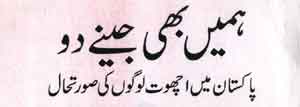
BY Pirbhu Lal Satyani
In this Urdu book titled Hamey bhi Jeene do, Published by Asar Publications, Lahore, 2005, Pirbhu Lal Satyani, a Hindu human rights activist in Lahore, has documented the plight of dalit Hindus in Pakistan. He says that a large number of dalit Hindus live in Sindh and South Punjab. To retain their supremacy, the pandits and the leaders divided the society and pushed dalits to the bottom of the social heirarchy. Not only has religious extremism affected them but also the state has neglected them.
In the second section of this book, the author describes how the number of Pakistani Dalits (whom he still calls “untouchable”) is declining. But, he says, the reason for this is not so much their migration to India, as is the case with upper caste Hindus, but forcible conversion to Islam. Some Dalits, he says, also convert out of greed, for the sake of better jobs and perks.
In the third section Pirbhu Lal Satyani focusses on the plight of the Dalit women and the atrocities meted out against them not only in their society but also by the majority Muslim community. Mr Satyani says that forcible conversions and rape of their women by the majority community are commonplace and the administration generally turns a blind eye to them. Most of the time the police does not register and FIR because of the influence of the majority community and even if they do, they do not take action.
The women have to wrap themselves up in typical coarse cloth so as to make them distinguishable in society. They suffer at every step thanks to their poverty, illiteracy and ignorance. They do not send their girls to school due to the fear that they might be kidnapped for forcible conversion or sexual assault. The author narrates a number of incidents where their women were kidnapped and sexually assaulted or made to convert to Islam.
In the fourth and final section, Mr Satyani makes a number of recommendations to the Pakistan government for the upliftment and development of the ‘untouchables’ in the country.
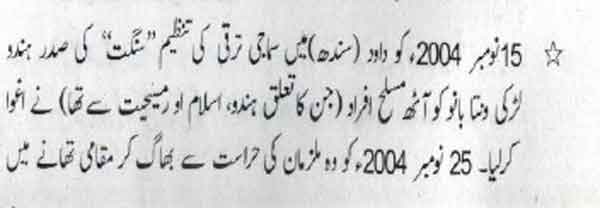
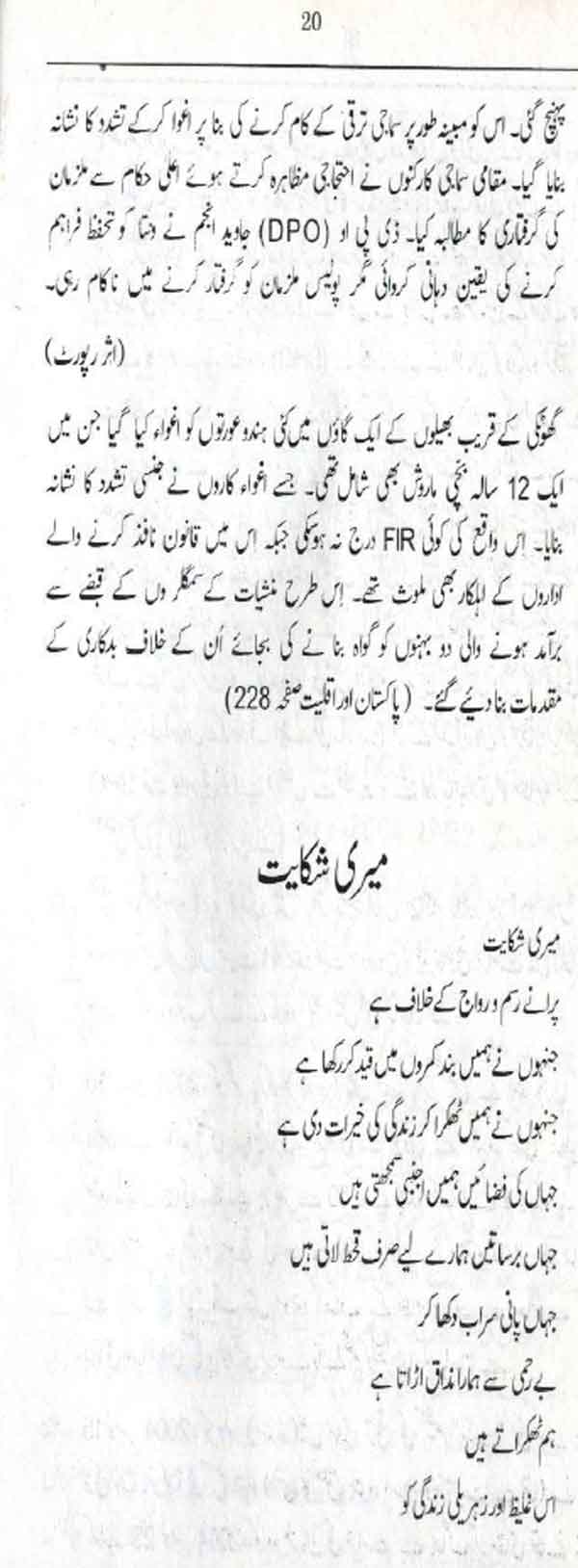
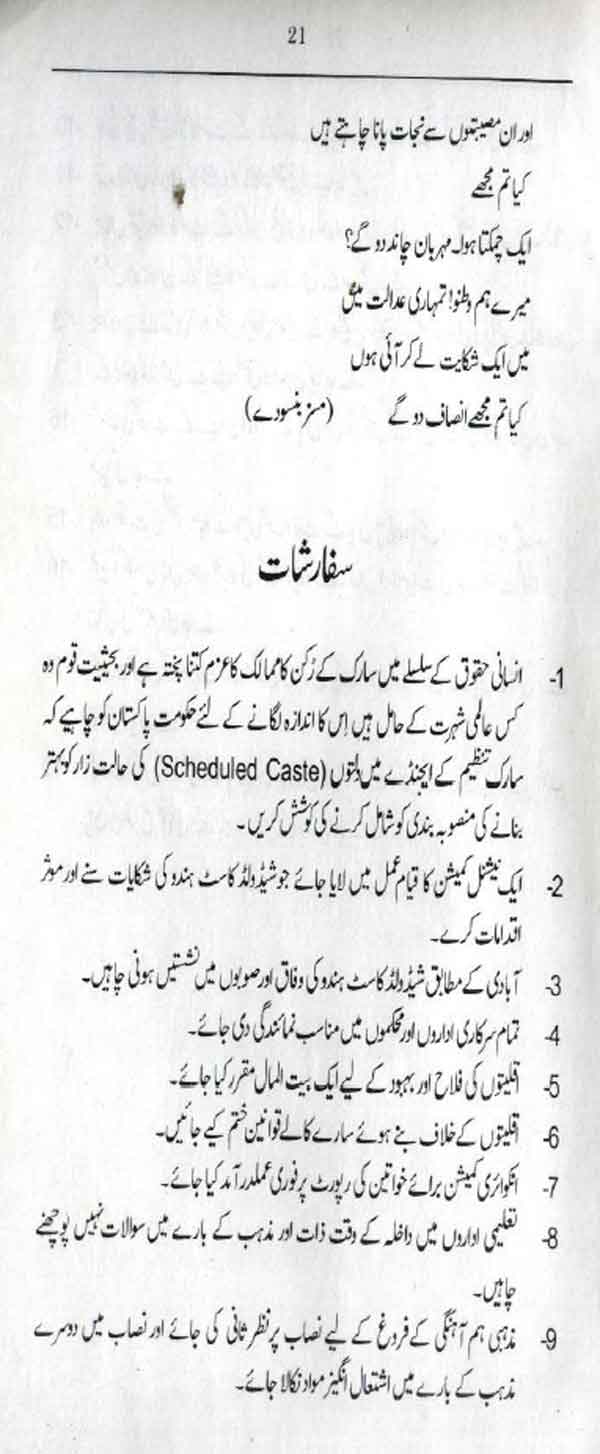
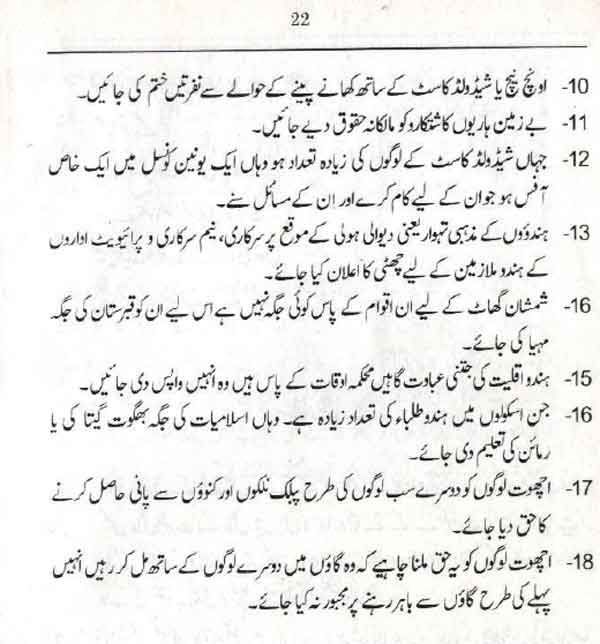




 Sultan Shahin
Sultan Shahin


0 comments:
Post a Comment